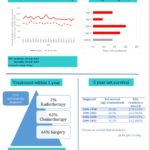Symptoms of ovarian cancer can be mild and vague and it can take a long time for symptoms to be noticeable.
Symptoms can include:
- Bloated feeling
- Persistent swollen abdomen
- Pain or dragging sensation in your lower abdomen or side
- Vague indigestion or nausea
- Poor appetite and feeling full quickly
- Changes in your bowel or bladder habits; for example, constipation or needing to pass water urgently
- Abnormal vaginal discharge or bleeding (rare)
Even though these symptoms can be caused by complaints other than cancer, do have them checked by your doctor.
For a clear presentation of the facts about ovarian cancer, its sign and symptoms, risk factors, treatment and other resources please visit www.ovarian-cancer.ie, the World Ovarian Cancer Day site and the Irish Cancer Society.
Facts
- The National Cancer Registry latest infographic on Ovarian Cancer present the key facts
- Ovarian cancer is the sixth most common cancer diagnosed in Ireland, the fourth most scommon cancer among women in Ireland, totalling 4% of all new invasive cancer cases and the fourth most common cause of cancer deaths. (National Cancer Register of Ireland)
- Approximately 384 women are diagnosed with ovarian/uterine cancer each year in Ireland and there are approximately 272 deaths per annum. (National Cancer Register of Ireland)
- Ireland has the third highest incidence of ovarian cancer in Europe and the Irish mortality rate from ovarian cancer is the highest in Europe.
- The five year survival rate in Ireland has, however, been increasing steadily in recent years. (National Cancer Register of Ireland)
- Worldwide, there are almost 250,000 ovarian cancers diagnosed each year. (National Cancer Register of Ireland)
- Ovarian cancer shows a strong geographical pattern with two main areas of higher risk. The first is centred on Cork city and extends over much of Munster and includes the Dingle peninsula. The second is in the eastern half of Northern Ireland. (National Cancer Register of Ireland)
Challenges
Three major challenges with ovarian cancer are:
- The often late diagnosis of the cancer (earning it the name ‘the silent killer’)
- A relatively high level of chemoresistance
- The fact that there is no standardised, reliable screening test
The late stage presentation of ovarian cancer is largely due to the vague and unspecific nature of the early symptoms which often mimic other less serious conditions and are sometimes interpreted by patients as normal changes in the body such as the effects of childbearing, menopause and ageing.
Get Involved
Would you like to get involved directly with the Foundation? Do you have ideas on how to raise funding and awareness for ovarian cancer? Call us today on 087 283 8770 or drop us an email at info@emercaseyfoundation.com, we would love to hear from you!
BEAT Ovarian Cancer Campaign
The BEAT Ovarian Cancer Campaign is telling women across Ireland that they can BEAT Ovarian Cancer by knowing their bodies, knowing the signs and talking to their GP at an early stage if they have any of the following signs for 3 weeks or more:
- Bloating that is persistent and doesn’t come and go
- Eating less and feeling full more quickly
- Abdominal and pelvic pain you feel most days
- Toilet – changes in urination or bowel habits


